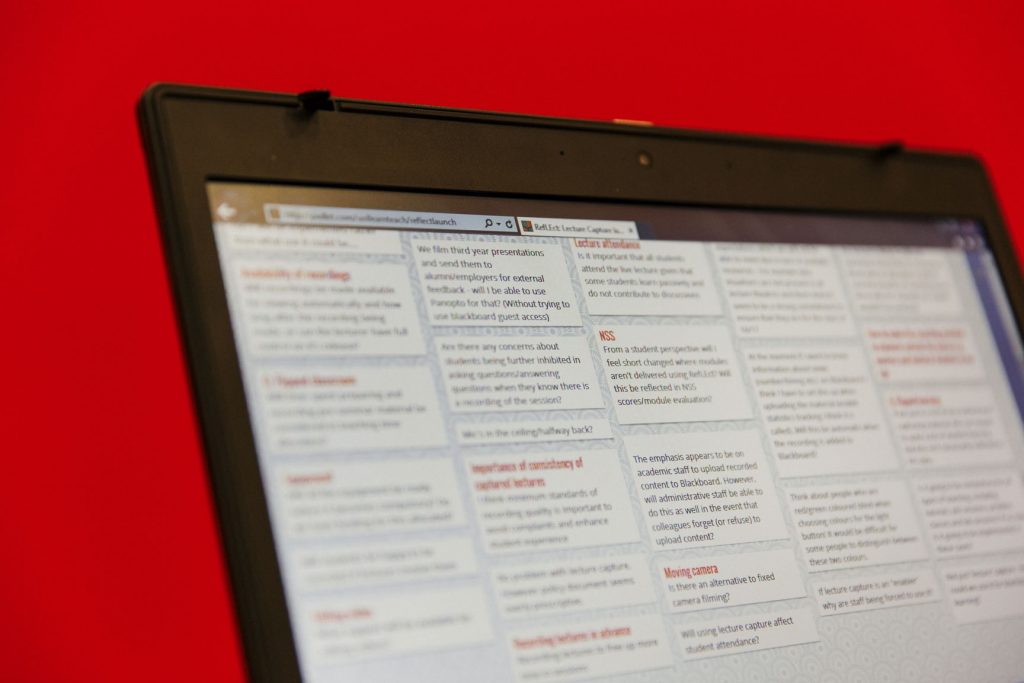The following questions and answers are taken from a panel debate on the challenges and opportunities of lecture capture, using questions submitted by participants during LLI’s Focus on Learning, Teaching and Assessment day. The debate was chaired by Jon Scott, Pro-Vice Chancellor (Student Experience) and the panel members were Alex Mitchell (Students’ Union Education Officer Elect), Corinne Fowler (Senior Lecturer in the School of English) and Frances Deepwell (Director of LLI).
The first two questions were answered by Jon Scott:
Is it going to be compulsory for all types of teaching, including tutorials, problem-based learning and lab sessions?
No. Lecturers can negotiate with their Head of Department not to record lectures if they don’t feel it’s appropriate. The draft policy also recognises that some types of teaching are not suitable for recording, which could include discussion-based teaching such as tutorials.
Why is there no discussion of the policy?
The policy was first developed in August and since then has been discussed at a series of University-level committees and also College Academic Committees, who were asked to take it to their teaching teams. It has gone through a number of iterations and is still not finalised. Feedback from colleagues has been taken into account, as have policies used at other Universities.

The remaining questions were put to the panel and opened up to further discussion with people in the room.
Are there any concerns about students being further inhibited in asking or answering questions when they know the session is being recorded?
Anecdotally, recording doesn’t make any difference to whether students respond to questions. If a student has enough confidence to speak in front of the group then they are unlikely to be put off by a recording device. It is a student-led initiative and being able to hear questions and responses from other students would be particularly valuable, particularly for international students, those with learning difficulties or Distance Learners.
This question also prompted wider discussion about how the introduction of new technology will inevitably lead to a rethink of how we teach and interact with large groups of students. Interaction in lectures is important and could take many forms, such as discussions between peers or interacting with materials.
As students learn differently, does it matter if some students prefer to miss a lecture because they prefer watching the recording?
Lecturers should make it matter – the live experience of a lecture should be different from just watching a recording, otherwise it’s understandable that students might not want to turn up. It’s important to see the whole teaching programme holistically, lectures and other teaching hours, and work with students to help them understand how you want them to learn.
The availability of recorded lectures will enable students to learn differently – for example to watch portions of lectures multiple times when they are revising. Lecturers are not always accessible to students from a variety of backgrounds. Also lecturers can direct students back to recorded lectures for questions about content, enabling them to focus on more meaningful discussions. Analytics on how students use the recordings can help drive the teaching, enabling lecturers to focus on areas that students find most problematic.
It can be a problem if students miss a lecture and don’t watch the recording before the next lecture, or even wait until just before the exams. Maybe there should be an expectation that students will engage more fully with their studies and attend all teaching events. Some departments (e.g. Medicine) have attendance requirements in order to pass the course and attendance monitoring is also on its way, so you will be able to identify students who aren’t attending and check on their progress. Students need to be engaged with the course and the institution; attendance isn’t the same as being engaged and learning.
A lecture should be the starting point of learning for students, not the totality. Universities need to emphasise the importance of education, but students still need to be in control and take responsibility for their own learning.
Will students feel short-changed if their lectures aren’t recorded and will be this reflected in NSS scores?
The fact that lecture capture is available in some departments and not others is already reflected in our NSS scores. Students make comparisons with students at other institutions as well as within their own University: there have been NSS comments asking why friends at other universities have lecture capture and they don’t.
Can we say as an institution that recording on students’ own devices is not allowed/encouraged?
There is currently a requirement on students to ask permission of the lecturer if they want to record a lecture, however this is very difficult to enforce. It is a disciplinary offence for students to publicise lecture recordings, for example to put them on YouTube. Anecdotally, fewer students make their own recordings when they know that lecture capture is available. This gives the lecturer more control than if students are making their own recordings. Students can’t download the recordings, they can only stream them, but lecturers can make podcasts available if they choose to do this.
For more information about RefLEct, please email reflect@le.ac.uk


 Subscribe to Rachel Tunstall's posts
Subscribe to Rachel Tunstall's posts
Recent Comments